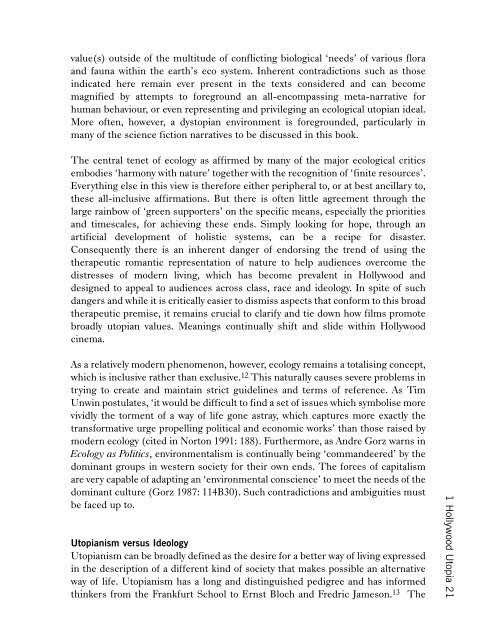Hollywood Utopia
Hollywood Utopia
Hollywood Utopia
You also want an ePaper? Increase the reach of your titles
YUMPU automatically turns print PDFs into web optimized ePapers that Google loves.
value(s) outside of the multitude of conflicting biological ‘needs’ of various flora<br />
and fauna within the earth’s eco system. Inherent contradictions such as those<br />
indicated here remain ever present in the texts considered and can become<br />
magnified by attempts to foreground an all-encompassing meta-narrative for<br />
human behaviour, or even representing and privileging an ecological utopian ideal.<br />
More often, however, a dystopian environment is foregrounded, particularly in<br />
many of the science fiction narratives to be discussed in this book.<br />
The central tenet of ecology as affirmed by many of the major ecological critics<br />
embodies ‘harmony with nature’ together with the recognition of ‘finite resources’.<br />
Everything else in this view is therefore either peripheral to, or at best ancillary to,<br />
these all-inclusive affirmations. But there is often little agreement through the<br />
large rainbow of ‘green supporters’ on the specific means, especially the priorities<br />
and timescales, for achieving these ends. Simply looking for hope, through an<br />
artificial development of holistic systems, can be a recipe for disaster.<br />
Consequently there is an inherent danger of endorsing the trend of using the<br />
therapeutic romantic representation of nature to help audiences overcome the<br />
distresses of modern living, which has become prevalent in <strong>Hollywood</strong> and<br />
designed to appeal to audiences across class, race and ideology. In spite of such<br />
dangers and while it is critically easier to dismiss aspects that conform to this broad<br />
therapeutic premise, it remains crucial to clarify and tie down how films promote<br />
broadly utopian values. Meanings continually shift and slide within <strong>Hollywood</strong><br />
cinema.<br />
As a relatively modern phenomenon, however, ecology remains a totalising concept,<br />
which is inclusive rather than exclusive. 12 This naturally causes severe problems in<br />
trying to create and maintain strict guidelines and terms of reference. As Tim<br />
Unwin postulates, ‘it would be difficult to find a set of issues which symbolise more<br />
vividly the torment of a way of life gone astray, which captures more exactly the<br />
transformative urge propelling political and economic works’ than those raised by<br />
modern ecology (cited in Norton 1991: 188). Furthermore, as Andre Gorz warns in<br />
Ecology as Politics, environmentalism is continually being ‘commandeered’ by the<br />
dominant groups in western society for their own ends. The forces of capitalism<br />
are very capable of adapting an ‘environmental conscience’ to meet the needs of the<br />
dominant culture (Gorz 1987: 114B30). Such contradictions and ambiguities must<br />
be faced up to.<br />
<strong>Utopia</strong>nism versus Ideology<br />
<strong>Utopia</strong>nism can be broadly defined as the desire for a better way of living expressed<br />
in the description of a different kind of society that makes possible an alternative<br />
way of life. <strong>Utopia</strong>nism has a long and distinguished pedigree and has informed<br />
thinkers from the Frankfurt School to Ernst Bloch and Fredric Jameson. 13 The<br />
1 <strong>Hollywood</strong> <strong>Utopia</strong> 21
















